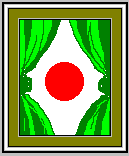| The Jinglish Tickle |
 A Window on Japan
A Window on JapanEpisode 2
Japanese with even a working knowledge of English is very difficult to find. So most foreigners here end up learning the Japanese language. So one of the first things you are asked to do on coming here is to learn the language. Your "experience" of the country is supposed to be enhanced by learning it. Well, no problem, you say, and plunge in putting your heart and kidneys and lungs into it.
Then you discover it - that the Japanese have one language, thank god, but actually three different types of scripts to write it! That's bad? Wait, it gets worse - while writing something, Japanese use all three scripts at the SAME time to express their ideas!!!......
The three scripts are "kanji" (Chinese pictographic characters), and the more recent "Hiragana" and "Katakana" (Japanese inventions). The fourth (and yes, there IS another - but this is a delight) script is "Romaji" - Japanese written using English alphabets specifically meant for dodos like us foreigners. So how does it work? In a typical sentence, nouns are in Kanji, subjects and verbs in Hiragana/Katakana (Romaji is NOT used for ordinary Japanese writing, and is used only when something needs to be communicated, I repeat, to dodos like us foreigners).
For example (written in Romaji for easy readability)
"Watashi wa Kenshu Santa de Nihon-go o benkyo-shimasu"
meaning - "I study Japanese at the Kenshu Center". Here, "watashi wa" will be written in Hiragana, "Kenshu" in Kanji, "Senta" in Katakana, "de", "o" and "shimasu" in Hiragana, and "Nihon-go" and "Benkyo" will be in Kanji. That's the tip of the iceberg.
The Japanese language has many forms of being spoken, from a very formal, almost regal form to the street variety, which can bring a blush to a thick skinned buffalo. Veterans speak of at least twelve forms in between. Most foreigners are taught the formal variety, so much so that when you speak Japanese to someone, it would sound like you are reciting "haiku" poems to the emperor or addressing a court official - perfectly out of character in ordinary conversations. They teach us this so that whosoever you speak to, you will not be offending anyone. But there lies the catch. The formal variety is so elaborate, that its quite difficult (at least initially, until you get familiar) to understand the Japanese that ordinary people speak, because there are so many "shortcuts" that before you latch on to the one word that you understand, the conversation will have finished! The formal type is not different, mind you, but just more elaborate, perfect grammar accompanied by archaic flourishes, that's all.
Katakana also has the honour of spelling out "foreign" English words. Hold your sides, folks, this is where the laugh begins. Now, guess what the word (and written as spelled in Romaji) "uisukii" means. No way you'll guess that one. It's WHISKY!!! Scotland, up in arms, I say! And what on earth is "purattohomu" (clue - its to do with trains). Well, my friend, no luck there too, I'm afraid: that is PLATFORM. I'm NOT making this up. This IS the way Japanese words are spelled in Romaji. And its official. Here's more classics: "Otobai" (autobike); "eameru" (airmail); "aisukuriimu" (ice-cream, for god's sake!); "Yooroppa" is no farmer from Karnataka, but is Europe. "serufu saabisu" in a snack bar will keep you waiting for a long time, because it means self-service. "erebeta" is not the latest in wave theory, but our good old elevator. And on it goes. Trying to figure out what "hanbaga" will leave you quite hungry - it's Hamburger. Besides, they also have this easy ability to shrink English words leaving you guessing what the original was - "Wapuro" is........Word processor and "Softo"? Not the latest in bedding. Software, that's all. "kohii" is coffee. That was easy. But say coffee to the waitress and she'll think you sneezed.
Classics, I tell you. Queen's English be damned. This is LIVING language. There's LIFE in it! (and laughs, as you'll discover).
But its a beautiful language. Very pleasant to hear. Especially when spoken properly (not formally). Just listen to a little child speak Japanese. It's a delight, I tell you. Its not harsh at all - Spoken slowly, its almost musical. But not sing-song. And amazingly complex. It's only when they try to include English words that the tickle begins.



Go back to Episode 1
 Go on to Episode 3
Go on to Episode 3